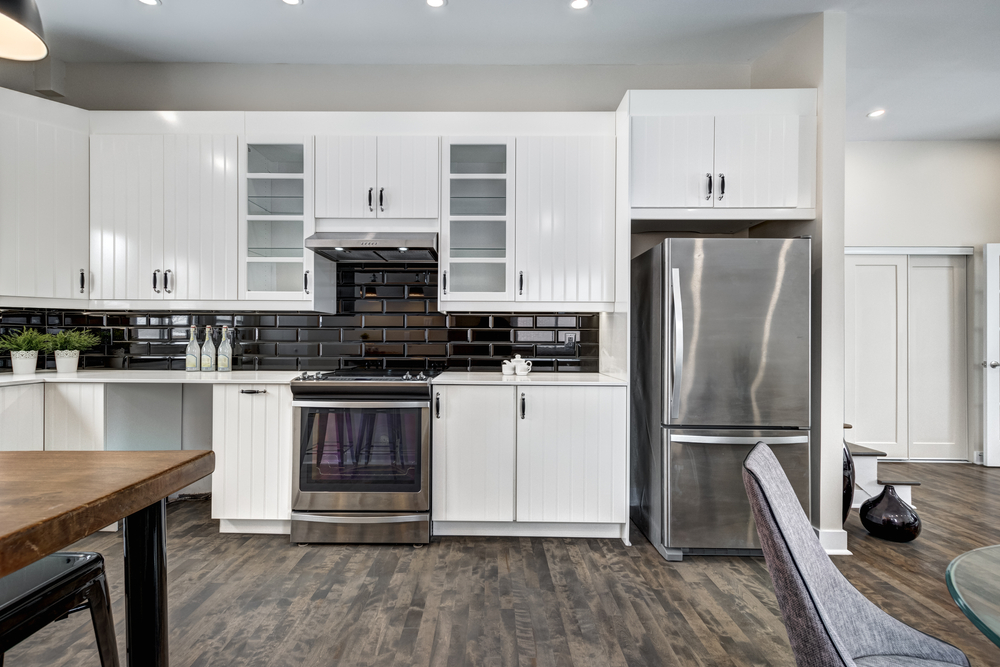Buying appliances for your basement can be trickier than buying for the rest of your home. Awkward angles, tight doorways and wrong measurements can create a number of setbacks you hadn’t planned for. If this is your first time buying appliances for your basement, be sure to plan ahead and have the correct measurements before you start shopping. Use these considerations as your Basement Appliance Buying Guide.
1. What is the Purpose of Your Basement?
Ideally, you will have figured out the purpose during the planning phase of your basement renovation. Speak with your pro about the use you envision for your basement. Will you be renting out your basement to tenants who will need an entire functioning kitchen? Or will you be using the space as a rec room for the kids? While you may have thought you need everything including the kitchen sink, you might only need a mini fridge and a microwave. Think about which appliances you will actually need so you can plan your purchases better.
2. Will the Appliance Fit?
Before you can begin shopping, it’s important you know what dimensions you’re looking for. The number one reason major appliances are returned is that they do not fit the space. We’ve all heard stories from friends or colleagues whose renovations have been delayed because they had the wrong dimensions. Don’t let this happen to you. Ask your basement renovation pro to measure twice and make sure to add an additional 1 inch for air flow for bigger appliances like stoves and fridges. Once you’re confident with the measurements, you’re one step closer to start shopping.
3. How Will You Get It Down There?
Basements can be tricky to access. From narrow doorways to staircases with odd angles, you may have a harder time than you first thought of getting your new appliance down there. Think about your access route. If you do have a narrow doorway, be sure to mark this measurement down and take it with you when you go to buy the appliances. If the appliance can’t get through your doorway, it’s not making it downstairs.
Once you’ve purchased, don’t be discouraged if the box does not fit downstairs. The box will always be bigger than the appliance itself since it’s filled with packing materials to help protect the product inside. If you can’t fit the box downstairs but know the appliance will fit through your doorway, take it out of the box upstairs and then carry it down. This option can sometimes be overlooked and could result in an unnecessary return to the store.
4. What’s Your Budget?
Now that you know which appliances you’re looking for, their measurements and the requirements to get them into your home, you can start shopping. Whether you shop online or in store, be sure you have a budget in mind. You may want to consider refurbished or previously owned appliances for your basement to help cut costs. Since a basement kitchen is likely to be seen less by guests, you don’t have to worry as much about the look of shiny new appliances.
If your basement is being used as a rental property, you will want to buy something energy efficient and visually appealing potential renters. For a basic kitchen with budget-friendly appliances, you should set aside about $3,000. The higher in quality and more specialized your appliances are, the higher your budget should be. Also, keep in mind that some stores will offer a discount if you buy all of your appliances from the same brand. Inquire about this as you comparison shop.
Bonus: Remember Maintenance
Remember that each new appliance you purchase will have to be serviced eventually. New appliances typically need service 25% of the time within the first year. Inquire about an extended warranty for items like dishwashers and stoves that require maintenance more frequently. Keep these cost factors in mind when shopping and planning. It doesn’t hurt to be prepared and have an appliance repair company in mind to call on should anything break down.
Another thing to keep in mind is that you will require a licensed plumber to connect your dishwasher. Be sure to have one ready when you go to install.
Now that you have a better idea of what’s involved in buying new basement appliances you can shop with confidence. Remember these basement appliance buying guide tips and you should have no issues when it comes time to have them installed. When you’re ready to start your basement renovation, be sure to find the right company for the job who can take your vision and make it a reality.


